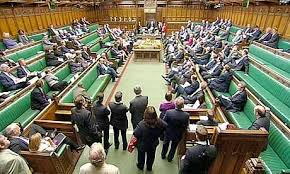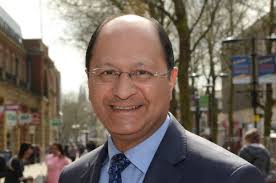Parliament debated the WASPI issue at the beginning of 2016. The culmination of months of hard work by the WASPI (Women Against State Pension Inequality) campaigners finally arrived on 7th January 2016. Mhairi Black (SNP MP for Paisley and Renfrewshire South) asked the Government to introduce “transitional arrangements” to help the hundreds of thousands of women suffering hardship as a result of the State Pension aged being raised from 60 to 66. It was never the campaigners’ case that the age should not have been raised at all – but that those women affected (born in the 1950’s) should have had proper notice to plan their finances and their retirement.
http://on.fb.me/1XazD71
Mhairi Black Raises the Pension Equalisation Debate in Parliament on the 7th Jan 2016
The surprise star of the show was the highly articulate and passionate Mhairi Black – aged just 21. With just eight months’ experience of being an MP, she shone out as a real champion of not just her own constituents, but all the WASPI’s who are victims of what was described as a “mess” caused by a succession of governments. This mess failed to communicate the raising of the State Pension age to those affected – either quickly enough or at all. Many women received contradictory notices from the DWP about when they could collect their pension and some received nothing. The resulting chaos is hundreds of thousands (if not millions) of women facing severe poverty, stress, physical and emotional health issues and relationship problems. Mhaira Black stated that these victims had been “shafted” by the government.

Another surprise in this issue has been the attitude of Ros Altmann who once “championed” the cause of women pensioners – even marching in the streets with them dressed as an “ordinary” woman. However, since being made Baroness and appointed Pensions Minister, her tune has changed from public-spirited enthusiasm to outright apathy at best – and total betrayal of WASPI victims at worst. The rest of the government has been no better – completely refusing to acknowledge the plight of the women affected.

Interestingly, former Pensions Minister Steve Webb, has admitted that the Coalition government did mess up pretty badly – both with the decisions and changes and with the way these were communicated to those affected. However, while claiming this was caused by the government not being “properly briefed” he also put much of the blame on the previous Labour government under Tony Blair and Gordon Brown.
The opposition side of the House was not only pretty full but also full of praise and admiration for Mhairi Black and the WASPI campaigners – many of whom were sitting in the gallery watching the proceedings. However, it was evident that few Conservative MP’s felt this was an important enough issue to attend the House of Commons – as only two of them turned up at the start of the debate. By the end, this had dribbled up to five. The disgrace of this apathy by the Conservatives was repeatedly noted.

Shadow Pensions Minister, Nick Thomas-Symonds, spoke in a powerful and compelling manner about the injustice of the situation addressed by the WASPI campaign. All those who heard him also heard a man of principle who will make an excellent champion for the millions of victims of pension problems in the UK.
By “champion”, I refer not just to the State Pension “mess” but also to the thousands of victims of pension scams who are facing poverty in retirement in the long term, and financial ruin in the short term at the hands of HMRC. Between 2010 and 2015 there were numerous pension liberation schemes set up, run and promoted by fraudsters who assured victims they could get “loans” from their personal and occupational pensions in a way that “exploited” tax law loopholes and that there would be no tax liabilities to pay. This has resulted in thousands of tax demands of 55% of the money “borrowed” from the pension funds – known as HMRC’s “unauthorised payment” charges.

Sadly, it is statistically inevitable that there will be some unfortunate women who are victims of both situations i.e. WASPIs who have also been scammed out of their personal or occupational pensions and will be forced to pay 55% tax charges by HMRC. The Ark Class Action (including victims of not just Ark but also Capita Oak, Evergreen, Salmon Enterprises, London Quantum and other pension liberation scams) has tried to address the tax position with the Government. The object of the exercise was to try to negotiate a tax “amnesty” for victims who were assured by the fraudsters (one of which was a government consultant) that their “loans” were legal and tax compliant.

The Secretary of the Ark Class Action met with her MP, Iain Duncan-Smith – also Work and Pensions Secretary – to raise the matter. He agreed it was an unfair situation and promised to organise a meeting with Chancellor George Osborne and Treasury Secretary David Gauke at the end of 2014. He took the Ark victim’s entire case file and assured her he would get back to her. That was the last she heard from him, and her case file mysteriously “disappeared”.

I have been tremendously inspired by the WASPI campaign, and impressed with the support provided by MP’s and leading journalists such as Paul Lewis and Jeff Prestridge. I hope this will lead to similar support being given to the Ark Class Action – as there is much to be learned from the WASPI founders’ approach. What WASPI and ACA have in common, of course, is they both represent a group of decent, honest, hard-working people who have been victims of injustice and whose interests are being ignored by the present government.

Journalists have often asked me whether I was myself a victim of pension liberation fraud, and sometimes I have felt almost ashamed to admit that I am not, and that by definition I cannot talk with first-hand experience of the pain and distress suffered by the victims. However, I am a WASPI having been born in late 1954 and so can attest to the fact that I have NEVER received any notification from the DWP about the change in my State Pension entitlement date.
Those who watched the debate on television will have seen and heard the passion of so many MP’s who have constituents affected by the WASPI problem. Viewers may also have noticed the pathetic turn out by Conservative MP’s – suggesting not just apathy but complete contempt for the matter. I myself noticed the blond woman sitting next to Shailesh Vara who couldn’t stop yawning while he was talking. I guess it must be pretty boring and exhausting listening to a Parliamentary Under Secretary of State at the Department for Work and Pensions trying – and failing – to defend the indefensible.

Unsurprisingly, the motion was carried by 158 to nil (the government didn’t even both to vote) – but there is no obligation by the government to do anything about the WASPI situation.
STATEMENTS (SMALL SELECTION) MADE BY MP’S DURING THE DEBATE
Mhairi Black (Paisley and Renfrewshire South – SNP): The 1995 Act increased the SP age for women from 60 to 65 to equalize the pension age so that women retired at the same age as men. The Turner Commission recommended that 15 years’ notice be given to individuals if their pension arrangements were to change to give them adequate time to respond appropriately. The changes were not to be brought in until 2010 which technically gave women 15 years’ notice. The problem is that nobody knew about that. As late as 2008, fewer than half of women knew that they would be affected. The National Centre for Social Research stated in 2011 that only 43% of women were aware of the planned change. Even the previous Pensions Minister, Steve Webb, recognised that not everybody knew that the changes had happened in the 1995 Act. Paul Lewis, financial journalist, told us that after researching he could barely find any reporting of the issue at all in 1995.
A response to a Freedom of Information request states that the Department eventually wrote to individuals affected and that “Mail campaigns took place between 2009 and 2013.” That is 14 years after the 1995 Act. Women were not personally notified by anybody official until 14 years after the changes came in. That is 14 fewer years that women have had to prepare and to try to make alternative arrangements.
But when giving evidence to the Work and Pensions Committee, financial journalist Paul Lewis told us that after researching this himself he could barely find any reporting of the issue at all in 1995. There were a few small press cuttings from the business pages at the back of some newspapers. A freedom of information request revealed that the Government did fund “broader” awareness campaigns, which ran in waves between 2001 and 2004, but that these campaigns “did not focus on equalisation in particular”. In fact, only one of the press adverts in those campaigns was focused on this issue—one press cutting roughly seven years after this had already been passed into law. It is quite evident that this whole thing became a total mess. I do not know whether it was not reported deliberately, for political reasons or fear of ramifications, or whether it was a genuine accident, but what I do know is that women were not notified. It was not reported and they were not given enough time to be able to make appropriate arrangements. This brings us on to the Pensions Act 2007, which increased the equalised state pension age from 65 to 66 between 2024 and 2026. It gave all affected people 17 years’ notice. That is fair enough, but then the Pensions Act 2011 came along and said, “Forget the 17 years’ notice, we’re going to rush this through. We need to do this right now.” The 2011 Act accelerated pension age equalisation for women and the subsequent increase to 66, effective from October 2016 onwards, meaning that affected women had only five years’ notice to try to remedy life plans that had been in place for years.
Geraint Davies (Swansea West) (Lab/Co-op): The hon. Lady is making an excellent speech and I welcome the debate she has brought to the House. Does she agree that many of these women have had a lifetime of low and unequal pay in low-paid jobs? They have had broken careers, because they have brought up children. Some may have got divorced or separated. Their whole life plan has been disrupted, destroyed and impoverished by this awful change.
Mhairi Black: I could not agree more with the hon. Gentleman. The 2011 Act made women wait an extra year to a year-and-a-half to claim their state pension. However, we have to remember and take into account the context that women did not know about the initial 1995 Act. We have a situation where there is a whole host of women who read about the 2011 Act and went, “Oh, God. Okay, I am going to have to be working an extra two years. I’d better start making plans. Oh no, wait a minute, I’m working till I’m 66. Where did that come from?” There is a whole host of women who have been given a double whammy. The Government have not and are not giving women enough time to prepare alternative plans. There have to be better transitional arrangements.
The Conservative ethos is to encourage independence and responsible choice, but how can that happen if we do not give people the time to make the responsible choices? By continuing this policy at such a high speed, the Government are knowingly and deliberately placing another burden on women who are already trying to deal with consequences of an Act passed 21 years ago that they have only now found out about. To put that into context, I am 21—that’s how old this is. One of my constituents told me that she began working at 17 and chose to pay the full rate of national insurance on the basis that she would retire at 60. Other options were available to her, but she said, “I want to retire at 60 so I’ll pay the price, through national insurance, my whole working life.” She put it in a way that I think is a very good and accurate description of what is happening. She has now found out that she is not retiring until she is 66. She says: “The coalition and this present Government have stripped us of our pensions with no prior warning and with no regard to the contract we all entered when we were 17.” She uses the term “contract”. That is an important point, because pensions are not benefits; they are a contract. People enter into them on the basis that if they pay x amount of national insurance they will receive y at a certain age.
The Government have said: “The policy decision to increase women’s state pension age is designed to remove the inequality between men and women.” That is a strange definition of equality: I am being shafted and short-changed purely because of when I was born and because I am a woman. That is not my definition of equality.
Tim Loughton (East Worthing and Shoreham) (Con): I congratulate Mhairi Black on leading today’s debate, for which there is an extraordinary turnout, showing the considerable interest of so many Members in this subject. I was approached by several constituents who said they were going to be disadvantaged. I recorded a short podcast on the subject, which has now been followed by 145,000 people, many of whom have written to me about it—and not just my own constituents either. I want to pay tribute to the Women Against State Pension Inequality campaign, which has articulated the case so well in front of the Select Committee. Its petition has now been signed, I believe, by more than 103,000 people. I want to thank the WASPI campaign for the help and support it gave me, not least in telling nonconstituents to write to their own MPs rather than have them all writing to me—and I am exceedingly grateful for that. We all agree with equalisation of the pension age. Large sums of money are involved and difficult decisions have to be made, but it is important that the rule of fairness is applied as much as possible, and it is clear that a sizeable group of women seem to be bearing the brunt of these changes disproportionately.
I have had representations from constituents who were in low-paid jobs with huge caring responsibilities for children and other family members when they did not have access to free child care and other things—and we have them to thank. Yet it is those people for whom I believe there has been a breach of trust, as these changes hit them disproportionately. We have a large duty of care to them, but I do not think we are going to fulfil it.




I am so relieved that this campagne is going ahead. I have worked all my life since the age of 15 and have now turned 60 no pension for me until I am 66 yet all my stamps have been paid in. I have rhumatoid artheritis and feel so very tired but must work because the money is needed in order to carry on everyday living. 6 years seems such a long time to carry on. I would very much like to sign the petition and know of any meetings in west cumbria. Thank goodness the women of this country have a united voice. Thank you so much. Odette Timmons
We are being used for goverment funding I am 62 this year I have worked since I was 15 I have paid my dues and I want my country my goverment to repay me for my hard workand dedication im tiredand I need to take a step back let some if the unemployed start work and earn a living give us hard working women what we deserve and whet we have paid all our lives for dont cheat this proportion of women born in the 50s we dont deserve it
Pingback: New state pension is robbing millennials to pay for the baby boomers - StuntFM 97.3